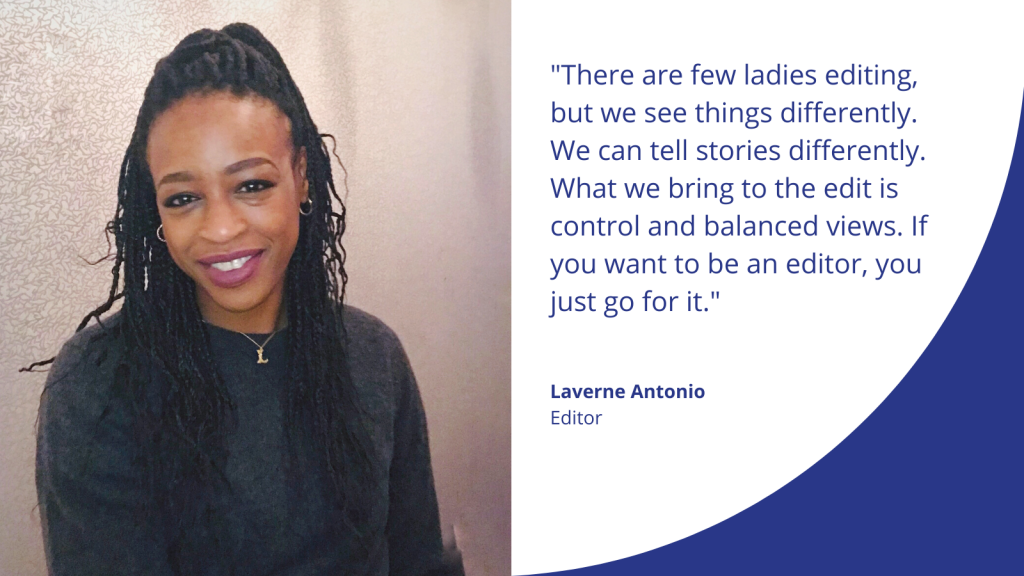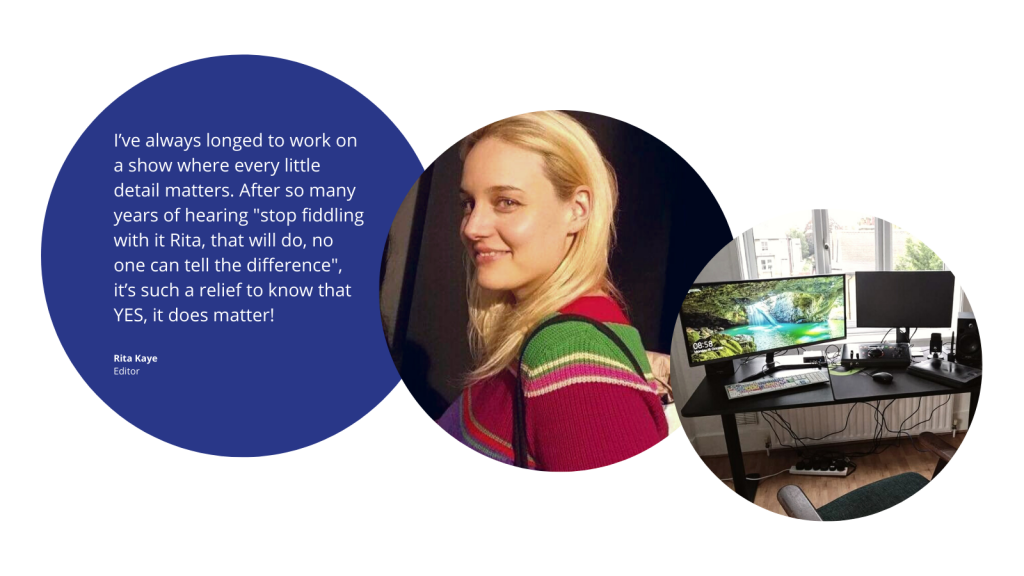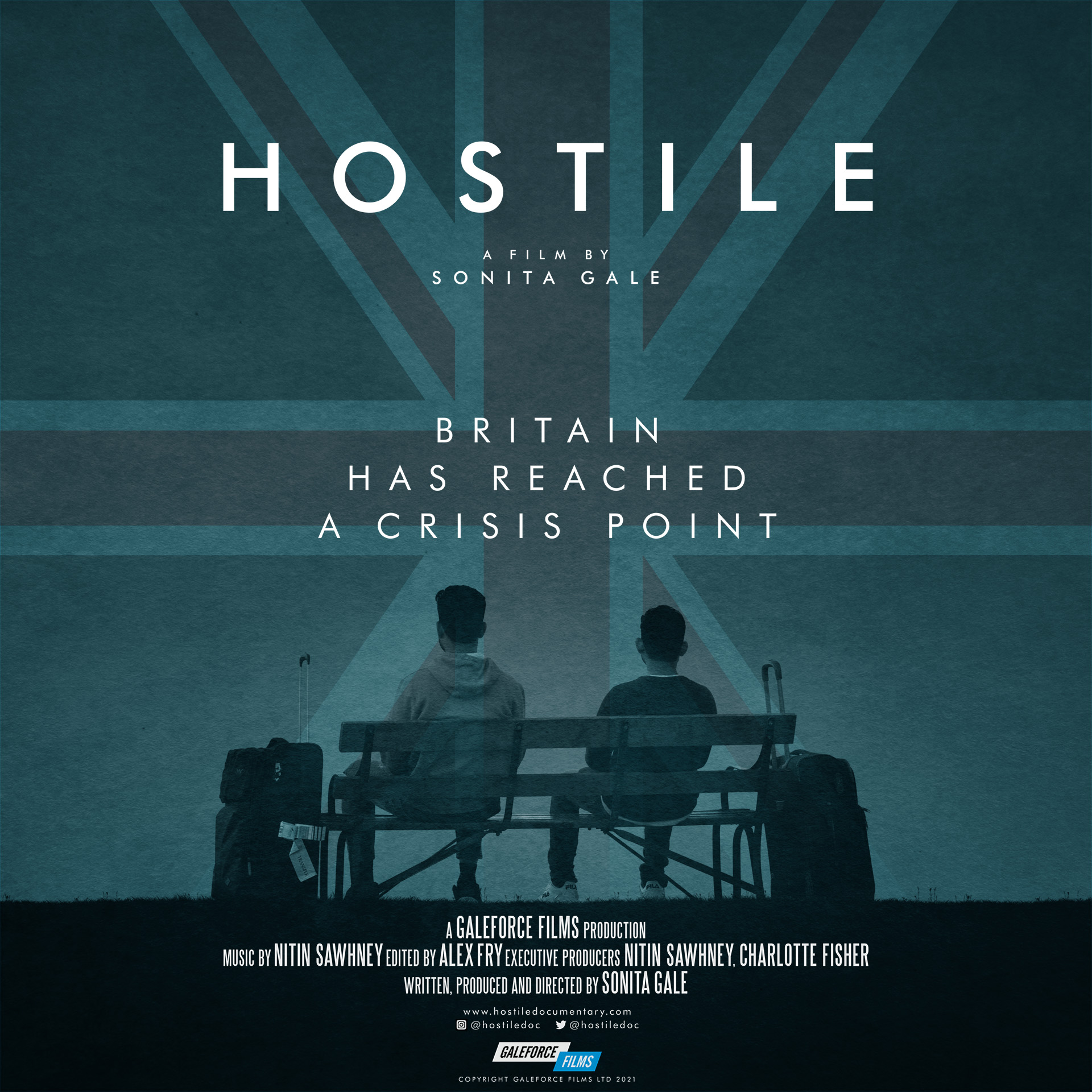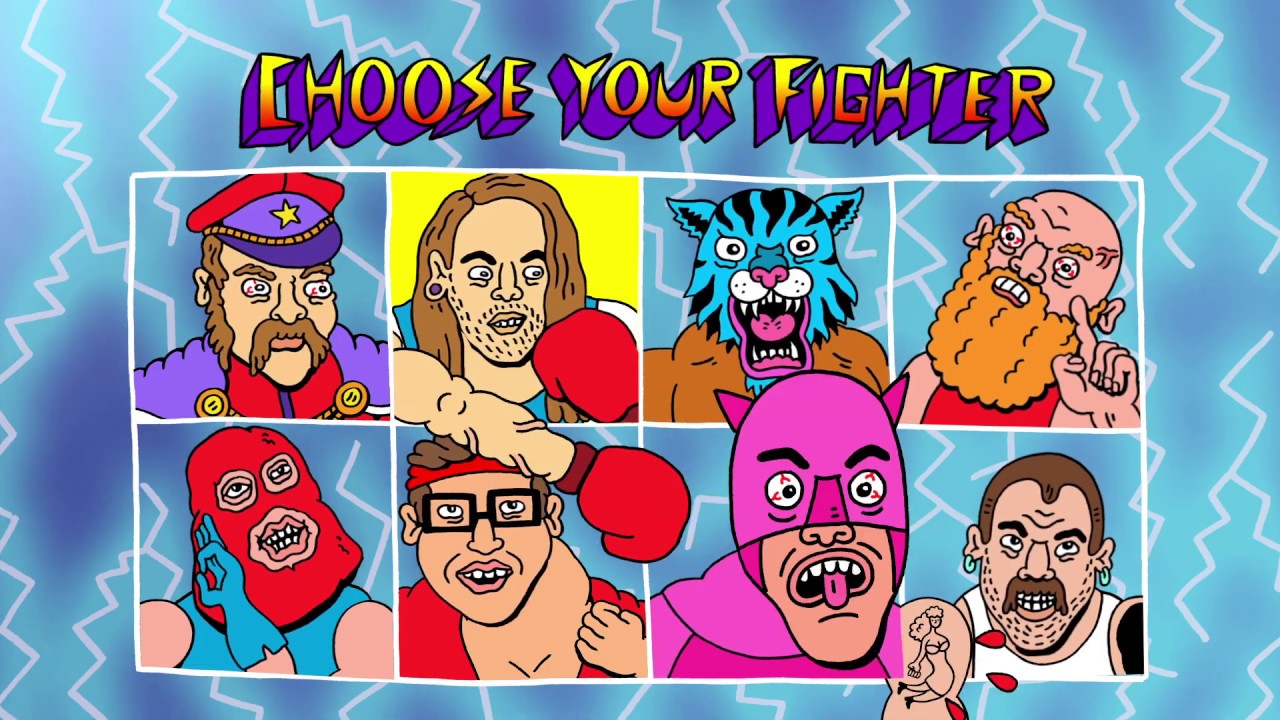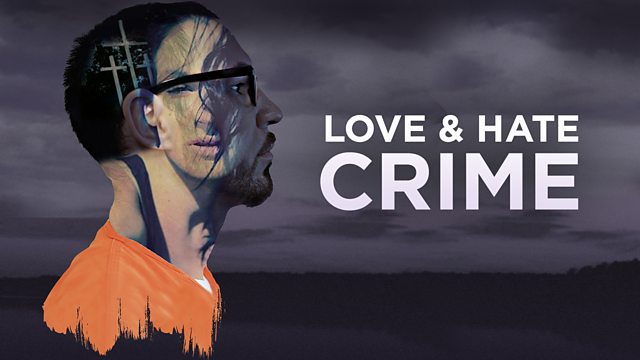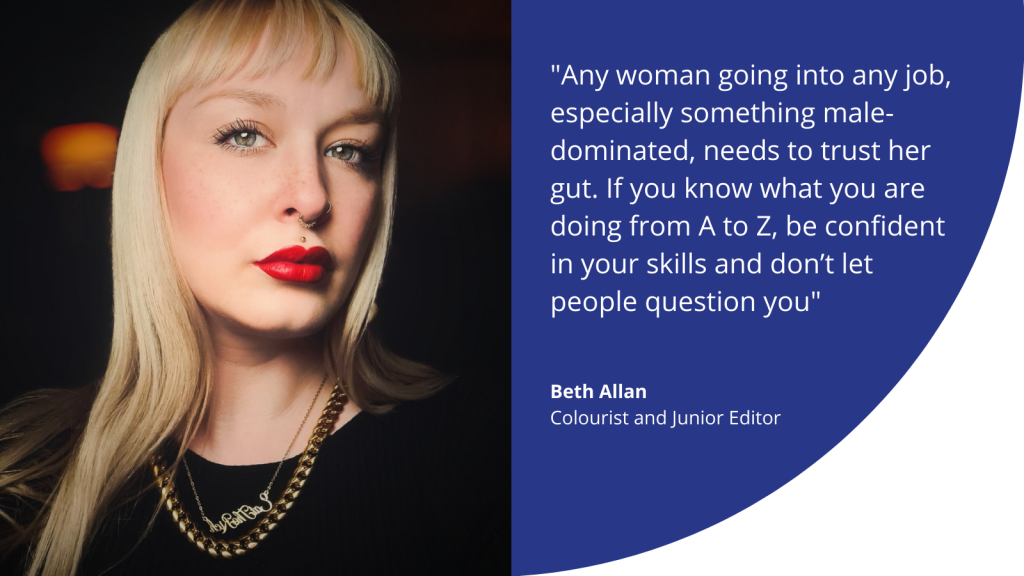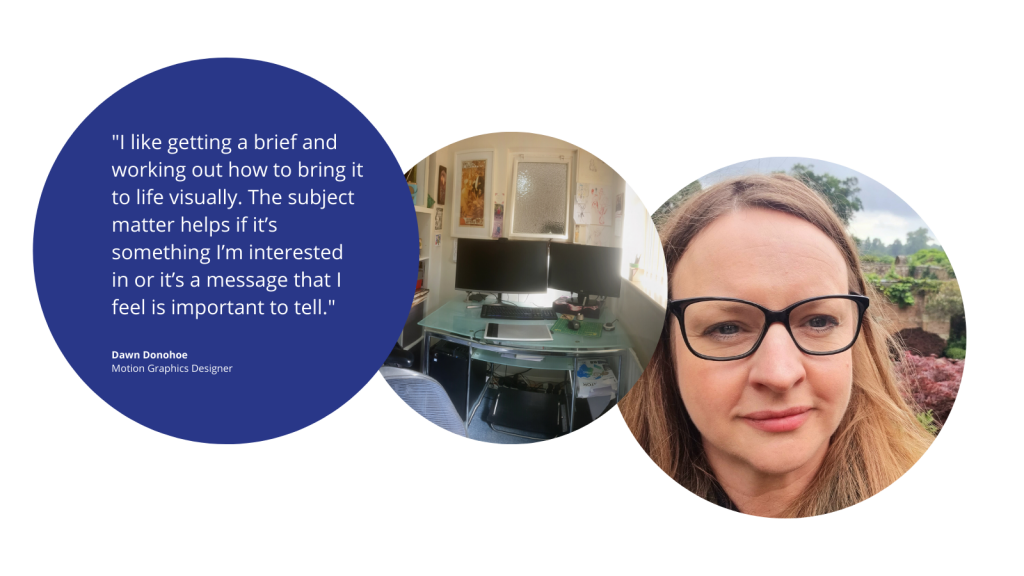Beth Allan is a Colourist and Junior/Assistant Editor. Recent projects that she has worked on include the documentary series ‘The Curse Of The Chippendales’, ‘Long Way Up’ and ‘Three Identical Strangers’.
Did you always want to pursue a career in post-production?
In short, yes. My Dad brought a tiny digital video camera when I was about 11 that could record short video clips. I told everyone I would edit videos when I was in school, and they all laughed at me. I was told on multiple occasions, ‘That’s not a real job. You’ll never make any money!’
Where did you train as an Editor and Colourist?
I went to the Confetti Institute of Creative Technologies. It’s a great institution that I try to tell many people about. They take anyone of any age, but mainly school leavers between 16-18. They train you specifically in post-production or audio post-production. Rather than going to university and doing a film studies course—where you mainly write film reviews and learn about the artistic side—Confetti focuses on post-production. You are learning from a young age about technical workflows and how to handle clients. It made me ready to hit the industry as soon as I’d finished there.
How did you get your break in the industry?
I suffer pretty severely from mental health problems. From 18 to 21, I was in the hospital most of the time recovering from a mental breakdown I had at 18. I was obviously out of the loop by the time I got back into society again because of that. Especially when that was a time when things switched over from Mini DV to digital workflows. I worked in bars and restaurants and did hospitality jobs. Still, I did work in Soho and was lucky enough to meet people that worked in the post houses in Soho. In their spare time, they gave me advice about getting into the industry. It really was a lucky break being offered a job by Pulse Films. They saw I had the technical knowledge, and I knew what to do. They were willing to gamble on me and gave me a chance to do my first job.
It shows that I really wanted it because I had to start completely from the beginning again after I was really sick. People said: ‘Do you really want to go into this industry? It’s tough work, and it can be quite cutthroat. People aren’t supportive of each other, and it’s really long hours.’ I loved it so much that I still wanted to do it.
Are there any particular women in post-production who have inspired you?
I will say that there tends to be a more significant slant towards women working in production or the management roles and men in the tech roles. I have met some fantastic female colourists, such as Vicky Matic, who used to work at Envy, but now works at Molinare. There’s also a young colourist named Meg Wan. I have a massive girl crush on her. I follow her, and she is my main inspiration for my grades. It’s lovely to see because she is a similar age to me. It’s not just an ‘all boys club’. You are starting to see people of our age breaking into it and making a name for themselves.
Do you think there’s still a massive divide?
Massively – to the point where some guys are shocked that I’m female when I come in on freelance jobs. I’ve been asked if I am a make-up artist. I’ve been asked if I’m the producer more times than I can remember. Everyone is so shocked to see women working in technical roles.
I don’t think I’ve experienced any sexism from my peers. I actually find the men I’ve worked with incredibly supportive, and they treat me like an equal. I will say that when it comes to clients and the upper management side, they can be pretty sexist. I think of our age group, and even up to our parents’ age group, they are more progressive. Execs and people funding productions at the top of the industry tend to be much older. And here is where sometimes the lingering old fashion attitudes lie.
Through Blueberry, I actually did some tutoring for the Grierson Trust for young people coming into film – from age 16 onwards. I’m amazed by how open and liberal-minded and forward-thinking they are. It gives me a lot of hope.
How much creative control do you have when working on a project?
It is such a vast sliding scale. I was surprised when I started working in colour and how little creative control you have unless you are the top colourist. People usually hire you to translate their vision into something on the screen. I personally have never been asked to do something that is my own style. I don’t take that offensively because I don’t know my style yet, as I’m still working that out. I’m still very much in the bread and butter days of doing my grading.
In my experience, the colourists who do get asked are people who have been doing it for 20 years. There are probably 5 of those people in London, and they are hired precisely because they love their style. Everyone else is hired because of their skill at translating someone else’s vision into something technically correct on screen.
Colourists seem very underappreciated in the industry…
I think people don’t even know we exist. When I tell people what my job is, I have to say to them it’s kind of like moving photoshop. People don’t know what the job role is. I show them the before and after and they say, ‘it’s horrible when it’s filmed!’ To put in a small shout out, it was my Dad who got me into cinema. My Dad has always been into foreign cinema and weird avant-garde films. He showed me them from a very young age. He showed me A Clockwork Orange when I was 12 – a film about ultraviolence! My Dad loved having someone to share it with. My Mum and sister, on the other hand, are very musical. He was a big inspiration.
Are there any particular projects you’d love to work on?
I live and breathe documentaries. I never thought this would be the case when I started. Everyone starts thinking they want to do drama, because drama is obviously the main thing you consume, whether watching a series or going to the cinema to watch features. I realise that I watch more documentaries than I do drama.
One of the first documentaries I got to work on was Three Identical Strangers. That went on to have such insane success afterwards. It won a Sundance award. I think it’s still on Netflix at the moment. There were only three people in post: the director, the editor and myself. That film was so packed with twists and turns. They managed to fit in all this information, this true-life story which was just harrowing and gut-wrenching into 90 minutes. In my opinion, the art of storytelling is so much more nuanced and fantastic than drama. I love documentaries so much.
What’s your day to day schedule like when working on a project such as Three Identical Strangers?
It really depends on what stage you are on in the project. I’ve been quite lucky. I’ve got narcolepsy, so I tend to have quite a set time schedule. I usually work from 9am to anywhere between 6-9pm, unless it’s getting towards the end of a project. Then, all bets are off. You could be working until 3am, sending exports out to execs and stuff like that. It’s a collaborative effort when you work on projects like that, especially documentaries because many rely heavily on archive footage. One of my jobs involves cutting archives, almost as much as cutting a whole show. That can take anywhere from a day to a week to do one episode of an hour.
It really does depend on where you are in the project. I would count myself as a finishing artist to do everything from assembly edits up to the grade. I started doing onlin(ing) during the lockdown. At the moment, I can do anywhere in that part of the post-process. Depending on what I’m hired on and what role, it massively varies.
Are there projects where you are hired to do more than one role?
Absolutely. Things nowadays are getting greenlit again. I sometimes have to double-up and maybe do a conform and a basic online, or perhaps a basic online and a grade because the budget doesn’t stretch to having those two roles separately. Honestly, I don’t mind because I know I’m delivering myself what I need. I love being more involved in the process and spending more time with the material.
What are you currently watching/reading?
Euphoria. I know this is a Gen Z classic right now. I absolutely love it. It is an unflinching reality with mental health, drug addiction, sexual abuse. If I’d had that show around when I was a teenager, I would have avoided so many sticky situations. I think it was done perfectly. I have so much confidence in the younger generation that there will be much less stigma, and they will be able to be nicer to each other.
My favourite film is another sombre film, Lilya-4-Ever by Lukas Moodysson. It’s a Swedish film set in Russia, about the sex trade and trafficking in Russia. When I was younger, I helped rehabilitate people that were victims of sex trafficking. Seeing that film gave me the impetus that made me help out with those charities. I don’t know if they still exist anymore. Still, there was a charity called the Poppy Project in London, which helps victims access psychological services and things like that. Seeing that film at 14 made me realise that this is happening worldwide. That’s an excellent example of cinema changing your life course. That and Moodysson’s Fucking Amal made me realise I wasn’t completely straight. So those films have had a significant impact on me!
Every industry has its pitfalls, but post-production is fantastic, and I want more women to work in it with us. I think women and non-binary people have inherently different viewpoints and ways of working, and they are all so worthy.
What advice do you have for other women pursuing a career in post-production?
Never let something slide if it makes you feel uncomfortable. Any woman going into any job, especially something male-dominated, needs to trust her gut. If you know your skillset and what you are doing from A to Z, be confident in your skills and don’t let people question you. Follow your instincts, trust your gut, and don’t let people talk down to you. I think many people will try and talk down to women and make them question their knowledge on things.
Don’t be afraid to speak up if someone makes you feel uncomfortable or something is unjust. That’s not just if something is happening to you. You may witness bullying in the workplace. Never be afraid to speak out about that and stand up for other people because it makes a better working environment for everyone else around you. Also, don’t let any of this put you off. Every industry has its pitfalls, but post-production is impressive, and I want more women to work in it with us. I think women and non-binary people have inherently different ways of working and points of view in projects, and they are all so worthy. It makes things one-sided if you only have one type of person working on a project or in the industry.
Mental Health Support
Beth was a spokesperson for Time to Change, a government initiative for mental healthcare. While Time to Change has closed, you can still find a useful range of resources on their website.
Papyrus (Prevention of Young Suicide in the UK) is a charity dedicated to the prevention of suicide and the promotion of positive mental health and emotional wellbeing in young people.
Mind provides advice and support to empower anyone experiencing a mental health problem. Mind campaigns to improve services, raise awareness and promote understanding.
Film and TV Charity supports those who work behind the scenes in film, TV or cinema, Whether you’re a researcher or a writer, in casting or production, editing or sales, distribution or exhibition, they are ready to help.
